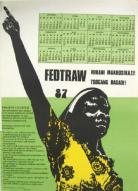In one of the largest demonstrations staged in this country's history, 55 years ago, 20 000 women of all races marched to Pretoria's Union Buildings on 9 August 1956, to present a petition against the carrying of passes by women to the prime minister, J G Strijdom. The march against the pass laws was organised by the Federation of South African Women (FSAW or FEDSAW), a federation committed to challenging the idea that 'a woman's place is in the kitchen', declaring it instead to be 'everywhere'.
It is this march that is commemorated in South Africa as Women's Day on 9 August each year.
Since then, the phrase 'wathint' abafazi, wathint' imbokodo' (You Strike a Woman, You Strike a Rock) has come to represent the courage and strength of South African women. As a group that has been marginalised, they rose to question the barrier and fought for their emancipation and that of their families. Women in South Africa have never constituted a homogenous group. There were and still are huge discrepancies between the 'haves' and 'have nots', but at many times in the struggle, women of all races and classes worked together, as can be seen in the formation of the Garment Workers Union in 1928 and FEDSAW in 1954.
SAHA has accumulated a range of posters, photographs and documents related to women's rights, with many of the collections reflecting the powerful contribution of women to the struggle.
AL2594 :: Jeanette Schoon Collection
AL2605 :: The NISAA Institute for Women's Development Collection
AL2924 :: Sally Sealey TRC Collection
AL2948 :: The Lucia Raadschelders Collection
AL3013 :: The Barbara Hogan Collection
AL3021 :: The Yasmin Sooka Collection
AL3045 :: The Jill Geber Collection
AL3111 :: The Chantelle Wyley Collection
AL3112 :: The Penelope Maysom Collection
AL3116 :: The Janet Cherry Collection
AL3117 :: The Laura Pollecutt Collection
For more information on how to access these collections, please email archives@saha.org.za







